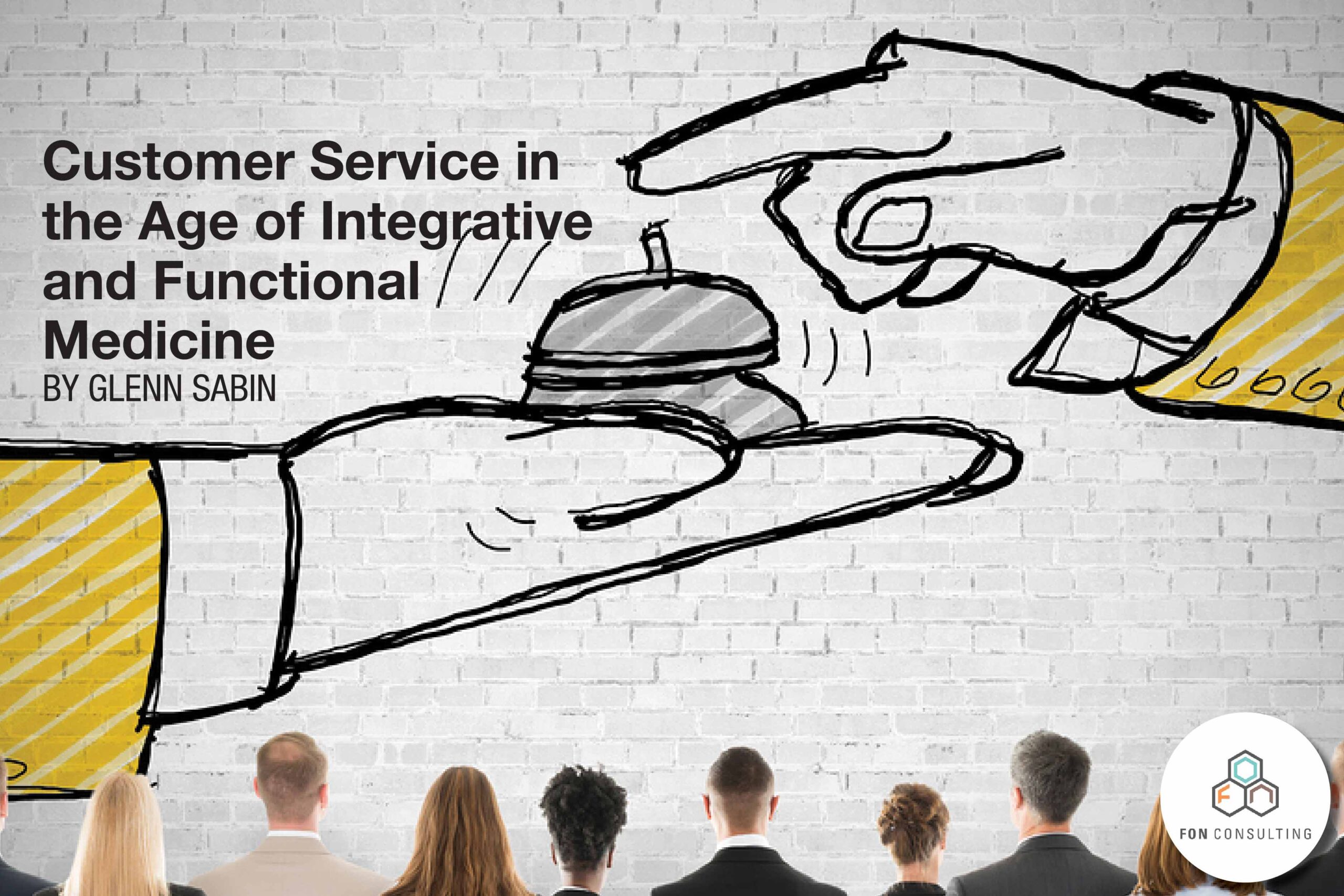Customer Service in the Age of Integrative and Functional Medicine

Consumers today expect responsiveness, authentic attention, and a high-quality experience—virtual or physical—from each and every one of their transactional relationships. This is non-negotiable. It’s a must-have.
Does the end-to-end customer experience your organization delivers align with a service ethos that drives retention, ensures loyalty, and creates fervent word-of-mouth referrals?
A Level of Customer Service and Convenience Unimaginable until Recently
Take Amazon one-click purchasing, while at home in your pajamas, from the comfort of your favorite coffee shop, or as you lie in a hammock—all with two-day Prime delivery to your front door.
Consider the convenience of retail vendor appointments, made online, tied to a ten-minute window (see: Apple).
Think about the advances in customer service to promote brand loyalty in the area of courtesy vehicles, shuttle services, and complimentary light food and beverages, while an automobile is serviced.
We have entered a consumer-centric service era that will severely punish companies (and integrative practices) that are out-of-touch or otherwise too slow to understand and adapt to their customers’ needs.
If you cannot fulfill your clients’ or patients’ needs at a level they now expect, they will go elsewhere. Conversely, those providers who consistently deliver these requirements—in this hyper-self-gratification, customer-demand-driven environment—will be the clear winners.
Adding ‘Hospitality’ to the Hospital Experience
Ever wonder how the word ‘hospital’ became the root of hospitality? It puzzles me, too. If I had the answer I would certainly share it right here.
No one likes to spend time in an environment steeped in disease care, surrounded by sick people. There’s the systemic, unshakable, and stark environment of cold and clinical décor; the bland (and often disease-promoting) institutional food; persistent odors and that of the agents used to cover them up; and little privacy, with constant interruptions, even during sleep. This barely touches the surface of what ails the typical hospital system and general care-centered service industry.
What I do know is that hospitals can learn a lot from luxury hotel chains.
Traditional hospitals and health systems are destined to become the epitome or poster child of a profound shift towards hospitality. This shift will be slow and steady, but it’s coming.
Medical delivery in the not-too-distant future will look more like wellness centers and spas of today—warmth and hospitality replacing the cold, clinical environment of outdated industry standards.
Many hospitals (and nursing homes, long-term memory care facilities, addiction centers, and medical centers) across the U.S. are beginning to pay more attention to design, and patient experience. Some are making sizable investments in hospitality, reimagining their health systems, from how they look, amenities and programs offered, to how they operate.
Boomers, Gen Xers, and especially Millennials demand more. Business leaders across industries—including those that deliver healthcare—will have to respond to retain their competitive edge.
This profound change in consumer needs aligns perfectly with the core ethos of integrative health clinical services and products providers, which brings us to…
Realizing Lifetime Customer Value
You are in the vanguard; your organization can embrace and integrate leading customer service processes and patient engagement—innovation and new best practices—for all centers, large and small.
If you operate a hybrid, membership, or another direct pay practice model, and outside of third-party payers, you will need to step up your modern customer service game to lead and prosper in this new environment. After all, you are, in theory, intending to offer more in terms of your time and attention in return for increased remuneration.
Today’s patients look for value, creature comforts, and quality experiences—from triage to discharge (or from intake to follow-up). Inpatient and outpatient experiences alike must align with a hospitality approach of uncompromising quality, attention, and responsiveness that consistently drives vociferous word-of-mouth referrals, loyalty, and retention.
Private integrative, functional, and lifestyle medicine clinics and centers tend to pay better attention to their physical clinical environment than do conventional practitioners. That’s a good start, as a comfortable, warm, healing environment is foundational for delivering quality, patient-centered care.
[Related content: 9 Ways to Earn Your Patient’s Lifetime Value]
However, an exceptional environment is only the foundation—you must build out this infrastructure to serve the needs of your ever-demanding modern customers—the same folks who patronize Apple, Amazon, and the hipper hospital that ‘comprehends and delivers’ modern customer service.
Ask Yourself…
Does my EMR/EHR provide a secure portal for emails between physicians, NPs, PAs, RN’s, and patients?
People are busier and more stressed than ever … can my patients and prospects book appointments online in real time?
Can new patients be guided along an automated, yet user-friendly, experience to complete the intake process outside your hours of operation?
Can patient account details be updated via the portal, and deductibles, copays, and membership fees paid online in a secure environment?
Are the posted FAQs comprehensive enough to adequately support the new patient onboarding process—from interested prospect to booked appointment?
Do I have enough staff to enable online chats in addition to phone and email communication (through website contact form) during normal hours of operation?
Enjoying this article? Subscribe and get our latest, delivered straight to your inbox.
Are healthy (complementary and/or reasonably priced) snacks and beverages offered to patients? Can the business model support this powerful, engaging touch?
Is my website modern, responsive in its design, and user friendly? Does it quickly communicate in six seconds or less (on average, this is how long you have) who we are and why a prospect should take further action, such as dig deeper into the site or book an appointment.
Does my website feature custom patient education and additional resources that serve as a hub for quality content to guide clients on the myriad conditions and pathologies in which my clinic or center (or other type of integrative health enterprise) specializes… or do clients have to go elsewhere for this type of meaningful support?
Am I using email automation to engage patients after their first clinical visit, to provide ongoing education and support as they get comfortable shifting their lifestyle toward healthier choices?
Is there a follow-up system in place to check in via phone with vulnerable patients after they receive a challenging diagnosis; or after a surgical or other invasive procedure; or after going through an especially traumatic clinical encounter? Or does my practice rely on patients to follow through on their next scheduled appointments, causing a ‘delayed’ and much less effective check-in to occur?
Speaking of follow-up calls and responsiveness—what is my company’s policy for returning calls, or for replying to emails sent through the website contact form? Are we responding to patients within one hour? Two? One business day? Does the website state the response time?
Take an Inventory: Map the Customer Experience
This is the tip of the iceberg in terms of what needs to be in place in order to create the most responsive, caring, and engaging customer experience for your patients and clients.
Now is the time to take inventory, and map the patient and customer journey—the experience from acquisition through long-term care—end-to-end.
Take time to honestly consider your own customer service expectations—those that include your current transactional relationships; for example: medical services, home repairs, your gym, minor or major retail purchases. Who absolutely nails it, and who leaves you longing for more, or better, customer service? What is missing?
Apply your own set of expectations to your business or practice and the people it serves. How would you grade yourself?
As a reader of this blog you are most likely connected to the integrative health and medicine service industry. You are part of an innovative, pioneering approach to root cause medicine and health creation versus disease care. Your focus, first and foremost, is on the host—and keeping her at the center of care—not the disease or comorbidities.
Where are the voids for added hospitality in service of your clients? Identify those voids, and then fill them in order to earn your customer’s lifetime value. Positive client experience results in creating an army of brand ambassadors driving endless word-of-mouth referrals to your customer/patient-centric organization.
About FON
FON is a leading integrative health and medicine business development and strategy consulting firm. FON specializes in custom solutions for growing patient volume, developing programs, and increasing product sales. Our practical business models are driven by innovative marketing, clear messaging, and customer engagement via branded storytelling.
Contact us today to schedule a complimentary 30-minute consultation to discuss your business development or personal brand needs.
[Photo Credit: AndreyPopov/BigStock.com]

Read Glenn’s story.

